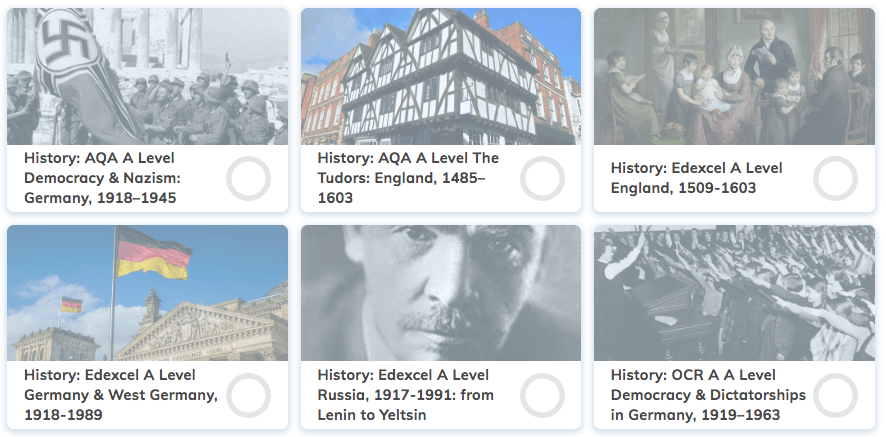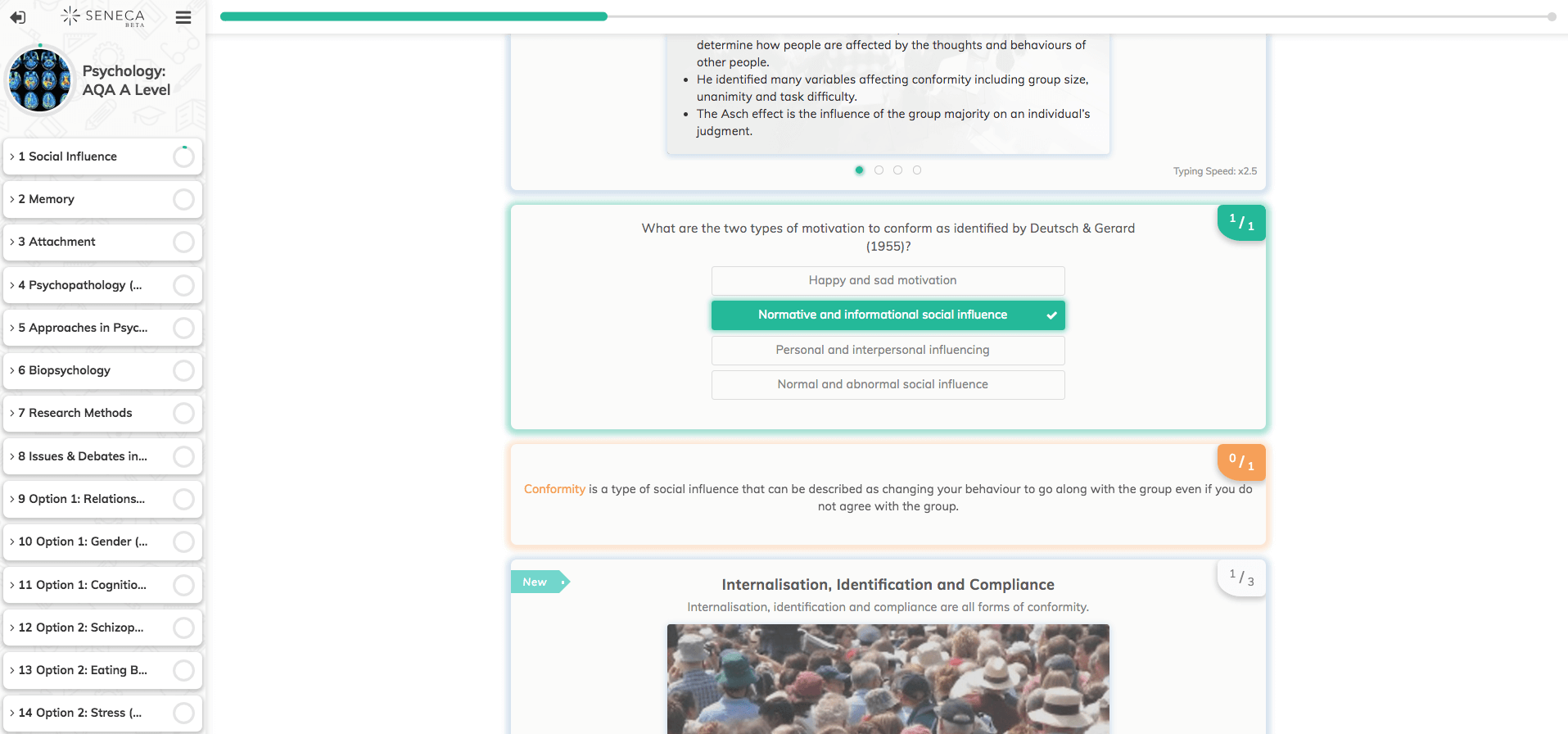

The Monster A Level Revision Guide To Getting A*s
Want to get A*s in your A Levels? Here are our top 10 revision tips and our best free A Level courses.
Before we start, do you actually know which subject you are?
Top 10 Revision Tips for A Levels
1. Use Seneca's Revision Courses
We're biased of course, but almost 3,000,000 students are using Seneca as their unfair advantage for revision. Don't miss out! The platform covers 250+ exam board specific courses with all the topics that you need to know for your exam. The great thing about Seneca is the interactivity. Instead of reading through boring static revision guides, Seneca covers the same information with GIFs, videos, revision podcasts, animations and interactive questions. Besides that, the platform will show you your strengths and weaknesses, so that you can really focus on the right topics. Try out our courses for Biology, Chemistry, Physics, Economics, Geography, History, and Psychology.
2. Create A Revision Timetable
Stick to a plan if you want to know everything you need come exam day. Be realistic and make sure you're not burned out. Revise the hardest topics/subjects first, instead of when you're tired at the end of the day. Always keep your revision sessions relatively short with frequent breaks. You can't concentrate for hours on end. Everyone's optimal revision timetable is unique, so don't care too much about how others are revising. However, it might be good to share your plan with your friends or family as it increase your chances of sticking to it.
3. Use Flashcards And Mind Maps
Many students use flashcards to repeat questions they got wrong. This is exactly how Seneca works as well. When you get an answer wrong then the question will be repeated in different formats a few minutes later. However, you might not always have access to a phone or internet, and thus flashcards can be a great way to quickly go over the harder topics. Similarly, it will help you memorise topics better by creating mind maps and connecting the dots. Hang them in your room so that you can frequently look at them.
4. Practice Past Exam Papers
Using flash cards and mind maps will only get you so far. What really sets students who get A*s apart from the rest, is the way they deal with exam prep and past papers. Firstly, do them. Download the past papers from your exam boards website and complete them all at least twice. Also be very strict on yourself, and redo the questions that you didn't get a full score on again. Or restudy the section you're struggling with on Seneca to build it up again in your mind. Try to really understand each answering technique and method. It's the best way to prepare for the exam, to experience how much time you have, and feel the level of difficulty.
5. Revise Throughout The Year
Each A Level subject has much more content than the same GCSE. Obviously. It's therefore even more important to start revising on time - the earlier the better. Start revising as early as you can by reading through your classwork occasionally, or completing a session on Seneca. Also try to look up past papers several months in advance. This will give you a good feeling of what you're expected to know and might make you realise on time that the road ahead is longer than you anticipated.
6. Read The Examiners' Reports
Each year the examiners create a guideline document of what they like to read (your papers clearly!) and provide examples of what not to do. These are the people that are actually going to mark your papers. So as you might imagine, this is super valuable information. Unfortunately, it's more useful for humanities (Geography, History, Business etc) relative to A Level Biology, Physics, Maths and Chemistry.
7. Get Enough Rest
It's incredibly important to revise without disturbances so that you can really concentrate on the subject. Even more important is to have sufficient sleep. A lack of sleep can significantly affect your mental performance and harm your memory, so also make sure to not get disturbed during your sleep. Things like a flickering or vibrating phone can already have a negative impact on your revision. Don't use your phones just before bed!
8. Master Answering Techniques
Don't be surprised to see a question on your exam that looks very familiar. It does happen that exam questions get just slightly altered each year. So make sure you go through all past exam and master the answering techniques. The way calculations are performed stays the same, it's just the context of the question that changes. So by applying the same technique to a variety of questions will really make you understand the concept.
9. Check The Syllabus
If you're unsure whether you covered every topic, then do check the syllabus. Use it as a checklist and simply tick a box at each section that you've covered.
10. Focus On Understanding
Although you might be cramming last minute, you do know that's not the way to go. They key to getting an A* on your exams is to not to know definitions, but really understand concepts and how to apply them. Try to make links among concepts and theories, and test yourself whether you really understand a concept and feel confident explaining it to a friend.
Seneca A Level Revision Courses
Biology
There are several ways we've seen students get top grades on the Biology exam. Whereas some prefer making mind maps of the syllabus and of each topic, other jump into their paper notes and transform them into flashcards.
What's new is that more and more students are jumping to online resources. And with close to 3,000,000 students across GCSE and A Level now using Seneca, you should also definitely give the A Level Biology courses a try. It will most likely turn out to be one of the easiest and most efficient ways of revising.
I highly recommend completing the full course on Seneca and then jumping into one of the past papers. While on Seneca, keep a good eye on the green circles that are indicative of your topic knowledge score. This reduces over time, so make sure to refresh the content regularly.

Chemistry
Do you know what haloalkanes or redox reactions are? If not, make sure you understand all the concepts before applying them to practice questions. Ask your teacher or friend to explain the difficult concepts and really make sure you know them all. Seneca is a great place to master the knowledge to help you tackle past papers.
Once you know them then start applying. Practice is crucial for Chemistry. Especially for the more difficult and math-based questions you need to practice. So definitely go through all the Seneca courses and past papers to get acquainted with the style of questions as well as to boost your confidence.
One of the best ways to use the practice questions is to explain the concepts to your friends. You only really understand it once you're able to explain it. Even firing some quick questions at each other can keep you sharp and provide you with a good understanding where you're at with your revision.

Physics
In Year 11, you might have gotten away with not having a deep understanding of all the Physics topics. But for your A Levels this is not going to cut it. It's crucial for passing your Physics exams to not stop until you understand all concepts. Especially during the year, make sure to stay on track as not understanding one topic will easily cause you to struggle with all subsequent topics. Perhaps keep a list of the concepts that you don't understand.
If you're stuck on a topic, then try to find as much material as you can. Whether it's YouTube videos, practice questions or Seneca courses. Go through them all and practice until you no longer get the concept wrong. You can start with easier text-book questions and built up towards the exam-style past paper questions. Practicing is the only approach that will really help to get an A* in Physics.
Next to the vast number of maths related questions, there are actually a lot of marks to be gained for defining, describing and explaining concepts. So try to make a list of all the definitions and study them by heart as it can give you a lot of easy points.

Economics
The A Level Economics syllabus is quite broad, so there are probably topics that you prefer. Don't start with these. If you prefer Macroeconomics over Microeconomics, then start with Microeconomics. Get the topics you dislike out of the way as soon as possible and early in the day when your mind is fresher.
A great way to revise is to use a variety of highly interactive material. Think about doing the Seneca economics courses in addition to watching YouTube tutorials explaining economics concepts.
Similarly to Maths and Science topics, it's crucial to practice, practice, practice. Make sure that you're confident with drawing economics diagrams and graphs, and that you're able to structure your answers.

Geography
For your A Level Geography exam you need to have knowledge of places, environments, concepts and processes. Seneca's revision courses can help you learn all the terms, build up all the knowledge and identify your weaknesses. Try one of the courses below:
The majority of points in the Geography exams are provided in the 9 and 20-mark questions. Here it's not only important to know the answer but being able to articulate why you think that's the correct answer. Use a healthy combination between discussion and use of evidence to substantiate your conclusion. Especially evidence from case studies and specific examples will score points.

History
Examiners usually care more about what you think than about what you know. They don't want you to simply cram all facts, but want you to be able to discuss questions. Your thoughts, arguments and interpretations of topics is far more important than the facts.
While having said that, it all starts by knowing the facts and the most effective way of learning these is actually taking one of the Seneca courses. As we've covered all the history topics in highly engaging content such as videos, GIFs and animations I can ensure you that you'll memorise the topic 2x faster compared to your revision notes.

Psychology
What's your plan to maximise your marks in A Level Psychology? It can be a tricky subject with lots of new terms and different assessment methods. So let's give you a few tips to get started.
Let's get revising digitally
Do you already have 4 massive ring binders full of Psychology notes? Let's start here by reducing your paper notes as much as possible. Try to keep them as tidy as possible and throw away any excess paper as this will make it much less daunting to look at. Moreover, start the AQA Psychology course on Seneca to interactively revise all the material you need. Even if you're not following the AQA spec, it would still be very helpful as there's significant overlap with other specifications.

Watch Psychology videos on YouTube
Ones you're getting fed up with reading paper notes or answering questions on Seneca, then it might be time to switch to YouTube for some videos. Simply perform some searches for psychology issues and common debates. These videos are generally very comprehensive and may provide information in a different format.
Fill the space and use the marks
On the exam paper is space to write the answer, so use this space as a guideline to how much detail the examiner expects from you. If you're only using half of the available space, then you're most likely not providing enough details.
Similarly, there's no need to go beyond the space. You're simply not expected to write such long answers if there isn't room. Moreover, this might actually cause you to spend too much time on "simpler" questions causing you eventually to run out of time.
When answering, keep an eye on the number of marks. If a questions is worth three marks, then you should definitely provide more than just one word or one sentence. A good guideline is write one distinct point for each mark. So for two marks you might give a definition plus an example.
Provide structured answers
When it comes down to writing paragraphs it's key to keep a clear structure as students on Student Room mentioned:
- Point (e.g. A strength of family dysfunction as an explanation for schizophrenia is that it has clinical evidence to support it)
- Evidence (Read et al. concluded that 69% of female patients with a diagnosis of schizophrenia had a history of physical/sexual abuse or both in their childhood)
- Explanation (This proves that difficult family relationships in childhood are associated with an increased risk of schizophrenia in adulthood)
- Counter-argue if possible (However, despite this being a strength, such evidence has a weakness because schizophrenia might have distorted patients' recall of their childhood experiences)
- Link (Although there is evidence to support family dysfunction as an explanation, the evidence might lack validity which means we need to be careful about generalising such results to real-life).






